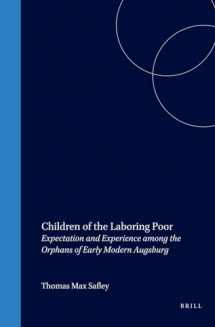
Children of the Laboring Poor: Expectation and Experience Among the Orphans of Early Modern Augsburg (Studies in Central European Histories)
Book details
Summary
Description
A companion volume to Charity and Economy in the Orphanages of Early Modern Augsburg, this book takes up the agency and individuality of the laboring poor and their children. It examines the economic lives of poor, distressed, or truncated families on the basis of 5,734 biographical descriptions of children who passed through the City, Catholic, and Lutheran orphanages of Augsburg between 1572 and 1806. Studied in conjunction with administrative, criminal, and fiscal records of various sorts, these “Orphan Books” reveal the laboring poor as flexible and adaptive. Their fates were determined neither by the poverty they suffered nor the charity they received. Rather, they responded to changing economic and social conditions by using Augsburg’s orphanages to extend their resources, care for their children, and create opportunities. The findings will interest historians of poverty, charity, labor, and the Reformation.


We would LOVE it if you could help us and other readers by reviewing the book
Book review



